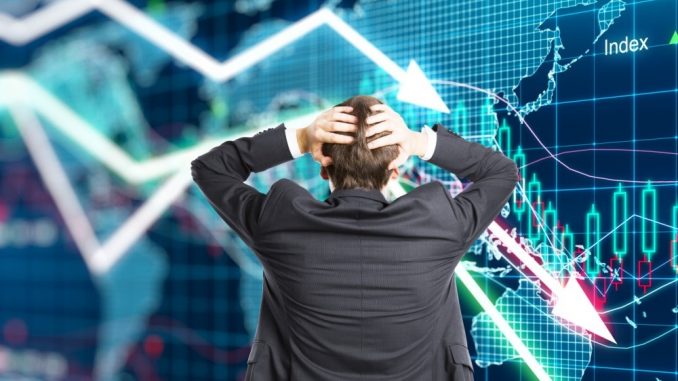
International stock markets displayed a new show of extreme sensibility on August 23. In New York, the main stock indicators fell around 3%, the second strong fall in fifteen days. That same day, it was made public that China would impose taxes on over 5000 US products worth 75.000 million dollars. Trump’s response was to increase taxes to U$S 550.000 million (the total of US imports to China) and to command US companies to break with China and return to invest and produce “at home”. Shortly after, the numbers of the evolution of the real economy were made public. All of them are falling. Capital is flying to its “safest” refugee, long-term bonds of the US Treasure, which makes their performance one of the lowest in the last 11 years, 1.56%. The Financial Times explained this extreme sensibility of the markets with one word: “panic”.
Recession in manufacture
Two indicators of the JP Morgan investments bank, quoted by Marxist economist Michael Roberts, show a clear tendency towards recession. At least in manufacturing, we can affirm that it has reached the main economies. He first points out that, by crossing their own threshold of 50, US manufacturing production has joined Germany and Japan in the recession. In the case of the United States, this recession is the deepest since 2009. The second one, a poll on businesses´ purchasing projections, also points out that this option is decelerating towards the future, therefore the perspective is that the current recession will continue or worsen, putting the possibility of a new crash on the horizon of the world economy.
Another factor that feeds this perspective is that world economic growth is around 2,4%, which means that it is on the brink of a global recession; a crisis that not only affects manufacturing, but also the service sector.
On the other hand, the data of the evolution of the big investment banks also show signs of crisis. Since last April, part of these banks announced the elimination of 30.000 jobs. Though most job losses are in Europe, 2.800 stock broker jobs were lost in New York alone. And one of the main reasons for this restructuring can be found in the falling referral profit rate of the central banks, which significantly cuts their profits.
This means that the perspective of a new crash covers both the real and the financial economy.
As a confession
While the G7 was meeting in Biarritz, France, the central banks of the main economies where holding their own summer meeting in Jackson Hole (Wyoming, United States). There, they were expecting the words of the chief of the FED, J. Powell, who is permanently attacked by Trump and pointed out as the main enemy of the country, at the same level as Xi Jinping. There, he said again that he will do whatever is necessary to maintain the economic expansion, but clarified that his monetary policy lacks tools to confront the commercial war. This means that, faced with the deepening of the confrontation of his country with China, Powell does not know what to do.
The debate at the FED about how to continue lowering the referral interest rate to take it to European levels, almost negative, divides the US central bank. A sector of its monetary policy committee bets on obeying Trump´s pressures, while the other part says that they should be maintained in the current level, since the perspective of the world economy could result in extreme credit volatility, affecting the world banking system even more.
The later sector demands that the government take fiscal measures. This means increasing public spending and reducing taxes even more. However, just as the recent fall of interest rates in the United States was taken with scepticism by the financial market and is not having repercussions in a greater level of the real economy, Trump´s colossal tax reduction in 2017 did not have that effect either; though he already announced that he is preparing a new tax reduction.
As Roberts pointed out, we will probably witness a combination of both measures, a new reduction of the interest rates and a new boost of the fiscal deficit of the United States, which, according to him, will not have the desired effect. This policy is what Japan has been applying for over a decade without the promised results.
Trade war, sovereign, corporative and personal debt
While the G7 meeting of the G7 was still occupied with the environmental disaster in the Amazon caused by the extractivist methods of agrobusiness, the Chinese government let the value of the yen fall again to confront the tax increase announced by the US government, shaking the Asian stock markets on August 26. This is another symptom of the commercial, technological and currency war between the two main world economies that, far from stopping, is deepening. This turns into one of the reasons that promote a new crash.
On other hand, the background of this whole situation is the fall of productive investment, the growth of corporative debt above their possibilities of payment, and the increase of personal debt, that does not help economic growth. This is compounded by the crisis of the Argentinian sovereign debt with an uncertain future. This brings the perspective of a new crash similar or greater than the one of 2008 closer every day.
This is why an article in the Financial Times that transmits disappointment and resignation, after warning a generalized global recession that could last many years is probable, and that it is impossible to understand why it took so much time to recognise the current situation of extreme risk, ends up affirming: “All that is required is a great default of the sovereign debt or a cascade of corporate bankruptcies, and the market could fall”.
A new crash of the world economy is on the horizon.
Carlos Carcione








